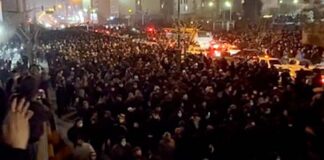The history of socialists’ opposition to war provides insights for today, argues Geraldine Fela
British Prime Minister David Cameron and US President Barack Obama have been forced into an embarrassing backdown over their plan to bomb Syria. Cameron was voted down in British parliament.
UN weapons inspectors are now in Syria to begin the process of forcing Bashar Al-Assad’s regime to surrender their chemical weapons, the compromise outcome reached by the US and Russia.
But Obama has made sure to keep the threat of bombings on the table. The US is desperate to find a way to take control of the Syrian crisis, counter the influence of its enemies backing Assad (Russia, Iran and China) and restore “stability” for their interests in the region. Australia’s ruling class shares the same concerns as its ally.
The possibility of Western intervention, with Australia’s backing, raised an important debate amongst socialists and anti-war activists who support the uprising against Assad’s neo-liberal dictatorship about how to respond.
Australian demonstrations of opposition to Western interference had previously been confined to pro-Assad zealots, primarily concerned with defending his regime.
Another proposed Sydney demonstration placed calls for the fall of Assad’s dictatorship before opposition to our own rulers’ interference, and criticised the intervention of Lebanese organisation Hezbollah, Iran and Russia at the same level.
These approaches were mistaken. There was a clear need to respond to Western war-mongering first and foremost. Since WWI, revolutionary socialists have maintained the position, as described by German revolutionary Karl Liebknecht in 1915, that “the main enemy is at home”.
War and imperialism
The last 100 years has been the bloodiest in human history. Sixteen million people died in the trenches in WWI. Recently, over one million civilians were killed in the Iraq war.
The constant drive to war can be explained by the competition for profits and resources inherent in the capitalist system. Governments, backed by corporations, compete with one another for resources, access and control on a global market. This competition regularly spills over into armed conflicts and war.
To build up support and enthusiasm for war, ruling classes use nationalism and racism to promote the idea we’re all “in it together”. But this competition to divide up the world’s spoils has only benefited the small minority that control corporations and states, not the millions that have died and suffered as a result of war.
The US’ drive to entrench their economic control over the Middle East, and keep out competitors like China, drove them into Iraq and Afghanistan. The Western intervention into Libya was designed to bring an upsurge under their control and ensure stability for Western interests; the same concern that has led to the possibility of intervention in Syria.
The fight to stop war is a fight against the capitalist system itself.
WWI
WWI was the first time that the anti-war politics of socialists were seriously tested. The declaration of war in August 1914 separated internationalist revolutionaries from those who quickly compromised and abandoned their principles.
Prior to the declaration of war, the socialist left was consistently anti-war. Just days before WWI was declared, the German Social Democratic Party’s (SPD’s) official paper Vorwärts said: “The socialist proletariat refuses all responsibility for the events which are being conjured by a ruling class blinded to the point of madness.” Then, after the declaration, the SPD backflipped and voted for a military budget. They were the most influential socialist organisation in the world, and their stance was adopted by the vast majority of socialist parties and socialists.
Their anti-war, anti-capitalist politics had been subordinated to opportunism. They had become entirely focused on the needs of parliamentary electoralism and were unprepared to make difficult arguments against the war and nationalism. Russian Bolshevik Vladimir Lenin described them as “twisted by nationalism and eaten up with opportunism”.
Revolutionary defeatism
The betrayal was absolute and devastating but it forced Lenin to develop a clear, uncompromising revolutionary strategy towards the war.
Central to this was the idea that the task of the working class was to fight the imperialist war by using the weapon of the class struggle, culminating in “civil war”, meaning revolution.
In September 1915, 38 anti-war socialists met for an international conference in Zimmerwald. Lenin and fellow Bolshevik Zinoviev distributed their pamphlet Socialism and War that argued not only for opposition to the war but crucially argued for “revolutionary defeatism”. Lenin argued against pacifist slogans like “neither victory nor defeat”. Instead, he said “Socialists of all the belligerent countries should wish for the defeat of all ‘their’ governments and express this wish”.
He argued that every military defeat against the government weakens and embarrasses the imperialist state, and this creates conditions in which the “imperial war” can become a civil war, a social revolution against the ruling class. Only through such a revolution can we put an end to capitalism’s drive to war.
Lenin and the Bolsheviks continued to argue throughout the war that socialists needed to fight against their own government, hope for their defeat and do everything in their power to make this happen. For a long time, Lenin stood almost alone amongst the anti-war revolutionaries in his “extremism”.
Yet his uncompromising stance was extremely important. The insistence that revolutionaries advocate for the downfall of their own nation meant there was no room for socialists to “fudge” their position on the war. It quickly exposed nationalist sentiments amongst socialists.
It meant that Lenin and the Bolsheviks, as well as their group of allies in the left of the German SPD such as Rosa Luxemburg, were not hesitant to agitate against their own states, leading strikes and demonstrations during the war—unlike those who had taken the side of their own government.
When the reality of war—rations, poverty, death and misery—sunk in for working class people, leading to mass unrest, it meant that Lenin and the Bolsheviks were ready and able to lead the 1917 revolution, with one of the key popular demands being an end to the war. In 1919, Lenin wrote, “The Bolsheviks have proved to be right, in the autumn of 1914 they declared to the world that the imperialist war would be transformed into civil war.”
Defeatism today
In every anti-war movement since WWI, similar arguments have come up. It has been crucial to wage the argument that to build a strong, militant campaign, we need to foremost our own ruling class.
The Vietnam war movement was extremely powerful because anti-imperialism was central to the campaign. There was a strong “common sense” that the enemy was the American and Australian governments and that their defeat was our victory.
This politics meant the movement was not afraid to challenge the capacity of the US or Australian state to function, employing what Lenin called “the weapon of class struggle.” Around Australia, unions and working people brought the system to a halt with mass strike days, moratoriums, against the war.
The movement against the wars in Iraq and Afghanistan never reached the same heights. But in countries where socialists insisted on the need of activists to fight against their own government to stop the war, the movement was powerful.
In Italy, mass radicalisation combined with anti-war sentiment. In 2002, three million demonstrated against Berlusconi in Rome, there were two general strikes, and the European Social Forum ended with a million-strong demonstration against the war.
Australia and Britain saw demonstrations that were larger even than those against the Vietnam war. Thousands recently took to the streets in Britain against Cameron’s proposal to bomb Syria.
However, in countries where the left was confused about who exactly their enemy should be, a strong anti-war movement did not materialise. In France, organisations that opposed the bombing of Afghanistan made the mistake of putting opposition to the Taliban and US imperialism at the same level. This undermined their ability to wage a clear anti-imperialist campaign and surrendered ground to the “humanitarian” justification for the bombing of Afghanistan. It meant the anti-war movement in France was largely unable to grow or mobilise, particularly among immigrant communities.
Revolutionaries and Syria
Any intervention in Syria will not be on the same scale as the wars in Iraq and Afghanistan because of the weakness of the US. But that is no reason not to oppose it as vehemently. In fact, the US’s inability to throw its weight around as much as it would like can be partly credited to mass anti-war consciousness created by the movements against the war on terror, and to the armed resistance to US war in Iraq and Afghanistan.
Pre-election, Kevin Rudd relished in the opportunity to use the Syria crisis to promote the supposed humanitarian virtues of Australian imperialism. Tony Abbott’s comment that the Syrian situation was “baddies versus baddies” overshadowed his statement of complete support for a bombing campaign. Abbott will get right behind any US attack.
Anti-war activists and socialists in Australia must be clear that our main enemy is the imperialism of the Australian ruling class. To present Assad and Australian imperialism as “equal evils” is to play into the hands of the Australian government that uses anti-Assad sentiment to justify bombings.
Opposition to the war must be put at the front, rather than any position on the Syrian revolution.
Syria’s revolution
This does not involve socialists reneging on their support for the revolution against Bashar Al-Assad’s brutal regime in Syria. The uprisings across the Arab world transformed the political landscape.
The Syrian revolution faces huge challenges: the Assad regime’s brutality backed by Iran, Russia, and Hezbollah; internally from groups like ISIS, the Islamic State of Iraq and Syria, that want to transform the revolution into a sectarian conflict; and internationally from the meddling of Western powers. Here, our most important task is opposing the latter. Genuine change cannot be achieved by American bombs, even if they lead to Assad’s downfall.
Bombing Syria could threaten the revolutionary and networks and organisation that have been formed by the Syrian people. It would allow Assad to pose as an anti-imperialist, sowing nationalism inside Syria and possibly even allowing him to rebuild some of his support. The best way to stand in solidarity with Syria is to consistently apply Liebknecht and Lenin’s lessons.





